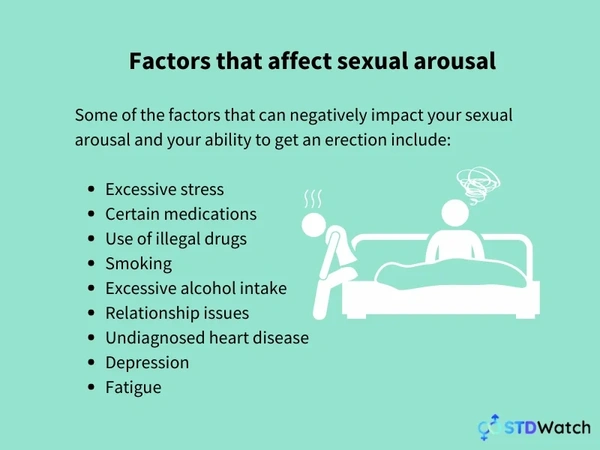Have you ever wondered how long an erection is supposed to last? Or how different hormones can affect your sex life? These are relatively common questions, and we have done the research so you don’t have to.
Let’s talk about how long the average man can stay erect, and how hormones can impact your sex life.
How long does an average erection last?
On average, the average erection lasts approximately 10 minutes. A study published by the The Journal of Sexual Medicine states that men in the study had erections that lasted 7 to 9 minutes, while men who took vardenafil (Levitra) had erections that lasted 9 to 11 minutes.
This may not seem very long, but it’s probably plenty enough for good sex. You see — the average length of penis-in-vagina sex is approximately 5 minutes, according to a different study published by The Journal of Sexual Medicine.
However, results varied from just half a minute to a whopping 44 minutes.
An erection is what happens when the penis becomes stiff, which happens due to sexual arousal. There are two chambers inside the penis called corpora cavernosa, which are cavernous or sponge-like spaces that fill up with blood when blood flow to the penis increases.
When this happens, the blood causes the penis to become engorged and erect. Once the stimulation passes, the excess blood exits the penis, and it returns to a flaccid state.
According to the Cleveland Clinic, ejaculation requires sexual stimulation and friction, which create impulses that travel through the spinal cord and into the brain. This reflex is triggered when a man reaches a high level of sexual excitement.
For ejaculation to happen, different structures such as the vas deferens, prostate, and seminal vesicles act together to produce sperm, and muscles at the base of the penis contract to release it.
There isn’t a set rule for exactly how long an erection is supposed to last, and there are many different factors that can affect erection duration. These factors can include time of the day, your overall mood, and even how much you slept the night before.
Keep in mind that PIV times don’t include everything that comes before penetration, such as foreplay, masturbation, or oral sex, which are incredibly important to the overall experience of having sex.
Interestingly, it’s also common for men to have erections while they sleep which last longer than daytime erections. A man can have 3 to 5 erections while sleeping, and according to the NHS, they can last anywhere from 25 to 35 minutes each.
Is it dangerous if my erection lasts too long?
If the average erection lasts 10 minutes, you probably don’t have anything to worry about if your erection goes on for a bit longer. But in some cases, excessively long erections can be a cause for concern.
Priapism is a prolonged, typically painful erection. This erection can continue for hours after sexual stimulation has occurred, or it may not even be related to sexual stimuli at all.
According to Mayo Clinic, priapism is a relatively uncommon condition, and it can lead to tissue damage resulting in erectile dysfunction. It’s important to seek medical assistance immediately if you ever experience an erection that doesn’t go away.
The impact of hormones on your sex life
The main male sex hormone is testosterone. Women also produce some testosterone, although at much lower levels than men. According to Harvard Health, testosterone has many different roles in male health, including:
- Development of the male sexual organs
- Presence of facial and pubic hair
- Regulation of sex drive
- Maintenance of bone mass
- Production of red blood cells and sperm
- Muscle mass and strength
As with other hormones in the human body, it’s ideal to have testosterone levels that fall within a certain range — not too much, and not too little.
Excessively low or high levels of testosterone can have a big impact on your health, leading to a number of different issues.
Low testosterone:
- Absence of facial, body, and pubic hair
- Loss of bone density and muscle mass
- Low libido
- Erectile dysfunction
- Low sperm count and infertility
- Poor concentration and irritability
- Depression
- Increased breast tissue
High testosterone:
- Low sperm count
- Erectile dysfunction
- Enlarged prostate
- Acne
- Fluid retention
- High blood pressure
- Elevated cholesterol
- Risk of blood clots
- Increased muscle mass
- Mood swings
- Irritability
- Impaired judgement
- Insomnia
Factors that can affect sexual arousal
It’s normal to have your libido fluctuate from one day to the next. Simple, everyday events can put you off the mood, while other things can make you want more sex. However, there are certain things that can have a more prolonged effect on your sex drive.
Some of the factors that can negatively impact your sexual arousal and your ability to get an erection include:
- Excessive stress
- Certain medications
- Use of illegal drugs
- Smoking
- Excessive alcohol intake
- Relationship issues
- Undiagnosed heart disease
- Depression
- Fatigue
*Written by Dr. Andrea Pinto Lopez on June 29, 2021. *
References
- Erection Ejaculation: How It Occurs - my.clevelandclinic.org
- A multinational population survey of intravaginal ejaculation latency time - pubmed.ncbi.nlm.nih.gov
- Duration of erection: does it really matter? A randomized, double-blind clinical trial to assess the impact of vardenafil ODT on duration of erection and its correlation with patients’ and partners’ sexual quality of life and duration of intercourse: the VADEOPEN study - pubmed.ncbi.nlm.nih.gov
- 5 penis facts - nhs.uk
- Priapism - mayoclinic.org
- Testosterone — What It Does and Doesn’t Do - health.harvard.edu



